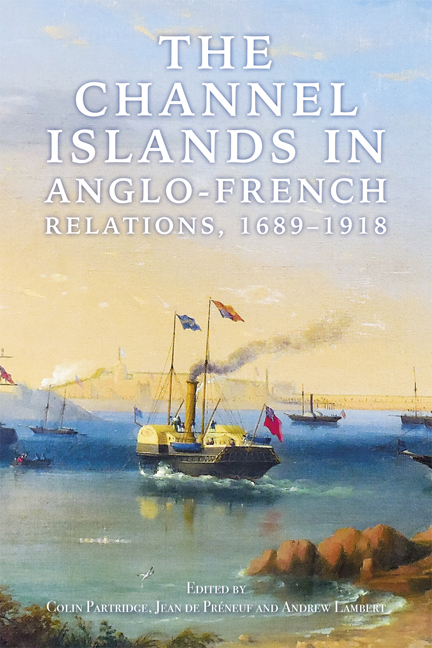Book contents
- Frontmatter
- Dedication
- Contents
- List of Illustrations
- List of Contributors
- Preface
- Introduction: ‘The Ehrenbreitstein of the English Channel’
- Part 1 Corsairs – the Ancien Régime and French Wars from 1689
- Part 2 The Islands – French and British Intelligence from the Seven Years War to 1815
- Part 3 Territorial Waters – the Land and Sea Interface from the 17th to 20th Centuries
- Part 4 Engineering Strategic Change
- Part 5 Alderney and the Channel Islands – Naval Strategy from 1815 to 1905
- Part 6 Civil Societies and Anglo-French Naval Rivalry – the 19th Century to WWI
- Part 7 Trade War – the Protection of Channel Islands Shipping in the Great War
- Afterword: Alderney, The Channel Islands, and the Study of History
- Bibliography
- Index
8 - Commanding the Channel: the Channel Islands in British Grand Strategy, 1814−1914
Published online by Cambridge University Press: 15 May 2024
- Frontmatter
- Dedication
- Contents
- List of Illustrations
- List of Contributors
- Preface
- Introduction: ‘The Ehrenbreitstein of the English Channel’
- Part 1 Corsairs – the Ancien Régime and French Wars from 1689
- Part 2 The Islands – French and British Intelligence from the Seven Years War to 1815
- Part 3 Territorial Waters – the Land and Sea Interface from the 17th to 20th Centuries
- Part 4 Engineering Strategic Change
- Part 5 Alderney and the Channel Islands – Naval Strategy from 1815 to 1905
- Part 6 Civil Societies and Anglo-French Naval Rivalry – the 19th Century to WWI
- Part 7 Trade War – the Protection of Channel Islands Shipping in the Great War
- Afterword: Alderney, The Channel Islands, and the Study of History
- Bibliography
- Index
Summary
Beginning in the late 1780s the strategic geography of the English Channel and Western Approaches would be fundamentally altered by the construction of large artificial harbours, extending existing ports into deep water and enhancing their security against wind and tide. While Cherbourg, Plymouth and Holyhead pre-dated steam shipping, later works at Dover, Portland and Alderney and French harbour upgrades at St Malo, Granville, Dunkirk and Calais, were influenced by the prospect that future wars in the Channel would be fought by steam ships. Steam navigation posed a particular challenge for the Channel Islands, which lacked the local capital to acquire and operate steamers, and the floating harbours needed to operate them efficiently. While some islanders tried to persuade the British Government to build such harbours, the new technology significantly reduced the Islands’ offensive strategic potential. After 1830 local naval operations would be shaped by steam, not small sailing vessels. Island privateering was no longer a significant asset, but the Islands remained critical to commanding the Channel. Their security became a national priority and required new harbours.
The Channel resumed its central place in British grand strategy after the 1814−15 Treaties of Paris and Vienna, where British diplomacy helped shape a European system to resist French expansion in Europe, while the Waterloo campaign demonstrated how the Castlereagh/Wellington diplomatic and strategic ‘System’ worked. With France constrained by the 1815 borders the only significant strategic threat it could pose to Britain would be against merchant shipping, especially at the focal point in the Channel and Western Approaches. As all French regimes between 1815 and 1870 attempted to secure domestic support by overturning the Vienna Settlement, these attempts frequently reduced Anglo-French relations to diplomatic crises and arms racing. It would be against the background of heightened tension that Britain developed a series of new naval stations to support steam warfare in the Channel, specifically to counter the emerging naval base at Cherbourg.
The Channel Islands remained a critical element in this response. In late 1830 former Prime Minister Wellington became anxious about their security, fearing a ‘Revolutionary’ French government would use war to maintain domestic credibility, encouraged by a francophile Whig administration that deliberately weakened links with Austria, Prussia and Russia, which had hitherto restrained France, and secured Britain's vital interests in Europe, keeping Belgium and the River Scheldt outside France.
- Type
- Chapter
- Information
- The Channel Islands in Anglo-French Relations, 1689-1918 , pp. 148 - 170Publisher: Boydell & BrewerPrint publication year: 2024



